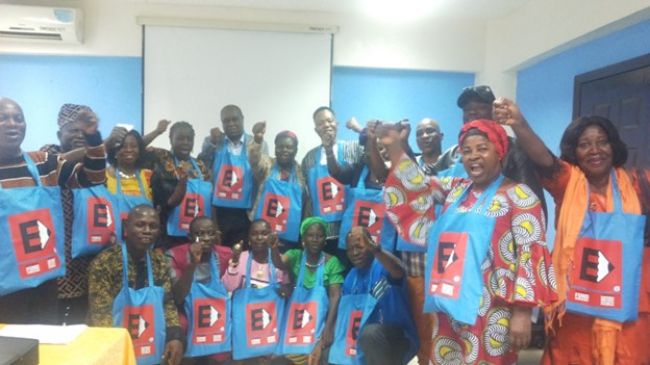EI Africa launches the Go Public! Fund Education Campaign in Monrovia – Liberia
The National Teachers Association of Liberia (NTAL) and Education International (El) Africa held a two-day workshop aimed at reviewing the state of education in Liberia in relation to the achievement of Sustainable Development Goal 4 aimed at ‘ensuring inclusive, equitable quality education and promoting lifelong learning opportunities for all’. The forum brought together NTAL leadership led by the president, Mary Nyuma, the labour centre , classroom teachers from both public and private schools, parents, students and a host of other education stakeholders from Liberia including civil society organisations.
In her opening remarks, the NTAL president noted that education in Liberia was under resourced, making it difficult for the teachers to deliver. Citing the role of the union, the president explained that the union had the responsibility to advocate for her members to have good working conditions, including the provision of adequate materials to facilitatequality teaching and learning. Citing the lack of commitment on education by the government, the president explained that lack of seriousness was eminent considering that there has never been a programme for Early Childhood Education (ECE) in Liberia.
In his opening remarks, the EI Africa Regional Director, Dr. Dennis Sinyolo, told participants about global commitments on education agreed in 2015 aimed at transforming the world by ending poverty, inequality, protecting the planet and ensuring health, justice and prosperity. It was therefore critical that teacher unions and education stakeholders guard the success of SDG 4. including holding governments responsible for ensuring that children are taught by well-trained, professionally qualified and motivated teachers.
During the presentation on the state of education in Liberia, it was noted that the government of Liberia was spending only 2.6% of the Gross National product and 13.8% of the National budget on education. The government had continued to outsource the education system to private providers through the Partnership Schools of Liberia (PSL) programme, which started in 2016 and metamorphosed to the Liberia Advanced Education Programme (LEAP). The governments had currently outsourced 300 schools to Bridge International Academies and was paying the teachers teaching in those schools. Considering to an earlier study done by ActionAid and Education International, it was clear that the current education dispensation in Liberia was creating inequality through privatisation and commercilisation of education.
There was consensus among stakeholders that the public schools were under resourced, with severe teacher shortages. It was noted that teacher training had declined since 2016. Most of the teachers were untrained, and some schools were run by volunteer teachers who hoped to one day be put on the government payroll. The average class size was 80, making it difficult for teachers to deliver effectively . Liberia had remained at the bottom on performance in the West African Examinations Council (WAEC) ranking.
It is against this background that Education international, NTAL and the education stakeholders in Liberia have put in place a strategy to relaunch the Global Campaign against privatisation and commercilisation of education which has since been combined with the new EI campaign ‘Go public! Fund Education’, launched on January 24, 2023. This aims at putting pressure on governments to rally resources to adequately fund education.
At the end of the workshop the stakeholders shared concern that the country’s resources were mismanaged resulting in the deplorable conditions at schools and general life in Liberia. They pledged to join the EI/NTAL campaign, ‘Go public! Fund Education.

[Mon, 03 Jul 2023 17:10:00 +0000] | DIGG THIS
Education International · No. 3 Torshie Close, · Mempeasem · Extensão de East Legon · Accra · Gana
Phone: +233.302.50.12.00 · Fax: +233.302.50.66.81 · Email: eirafoffice@ei-ie.org
Website Development and Design by Cyblance
